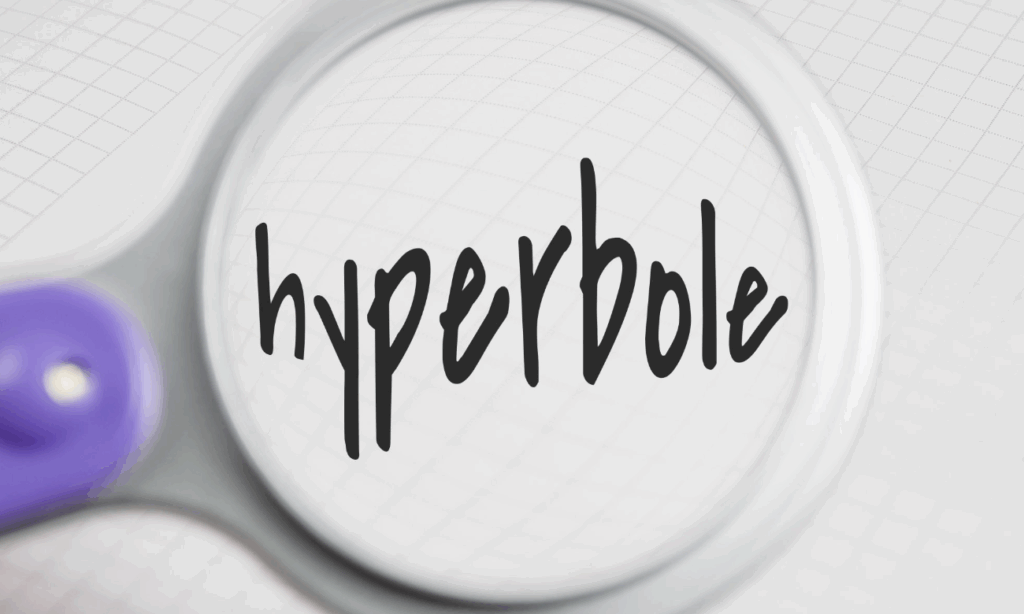
Hyperbole Different From Metaphor : As we dive into the beautiful colors of language, several folks often get lost between two popular literary devices, hyperbole vs metaphor. Differentiating hyperbole from metaphor is crucial not only for learners (and for authors) but for anyone who loves a good word. This article will explain the difference between these 2 figures of speech and how to use them to great effect.
What is Hyperbole?
Hyperbole Hyperbole is a figure of speech in which exaggeration is used to draw attention to something or create a strong impression. Of course, not to be taken seriously (it’s hyperbole, as you should know.).
Example of hyperbole:
“I’ve said a billion times to you.”
Here the literal meaning isn’t one million times, but the exaggeration serves to underline frustration, or persistence.
What is Metaphor?
Hyperbole Different From Metaphor : A simile and a metaphor are not the same thing, though they are similar types of things. A simile compares two things that share a common feature; a metaphor says that one thing is another thing, regardless of the fact that this is impossible. Unlike similes, metaphors don’t use “like” or “as” to compare the two things, but instead make the assertion that one thing is the other.
Example of metaphor:
“Time is a thief.”
It’s an image so alive that it plays as a metaphor for life in time to time itself robbing us of our moments, even if it’s not by way of actual theft.
Different from Metaphor: The Meaning of Hyperbole
On the surface, hyperbole and metaphor are alike, both employing creative language. But, the difference between metaphor and hyperbole is really in motive and methodology.
- Benefits: Both hyperbole and metaphor are similar in degree, as hyperbole attempts to exaggerate for the sake of emphasis, whereas metaphor aspires to compare things for the purpose of deeper understanding.
- Literal Language and Figurative Language: More than anything, hyperbole exaggerates the truth, sometime to the point of a lie (although it is never meant that way), and metaphor substitutes one idea for another with the intention of showing something new.
- Tone and Effect: Hyperbole serves as comic exaggeration, or to intensify the frame; metaphor introduces a dimension of poetry or profundity.
To understand fully theHyperbole Different From Metaphor, hyperbole which is not a metaphor, note how they operate in everyday speech and writing.
How Hyperbole Creates Impact
Hyperbole Different From Metaphor : There’s power in hyperbole, both in grabbing attention and indicating serious emotion. It’s a device that brings descriptions to life and makes them memorable. What he says is, for example:
“I’m so hungry I could eat a horse.”
This isn’t a statement of literal intent so much as one of dramatic hunger.
In advertising, hyperbole can bring product benefits to the fore:
“Our detergent gets out stains on the spot!”
Even if “instantly” is not meant to be taken quite so literally, the exaggeration inspires trust.
How Metaphor Creates Meaning
Hyperbole Different From Metaphor : Metaphors can encourage readers or listeners to think below the surface. They enrich language by linking new ideas in unexpected ways.
Think of this line from a work of literature:
“The world is a stage.”
Hyperbole Different From Metaphor : This metaphor implies performance, roles, and games in life, and it is likely to lead to reflection upon human behavior.
Unlike either hyperbole or unlike metaphor metaphor featured heavily on appeal to the human emotions and reason of which many explanations are harbored.
Examples of Hyperbole Not like a metaphor
Example 1: Describing Speed
- Hyperbole: “He ran at the speed of light.”
- Metaphor: “He is a cheetah on the track.”
Hyperbole Different From Metaphor : The impossible speed is hyperbole; the swiftness is metaphorically illustrated by comparing the person to a fast animal.
Example 2: Expressing Sadness
- Hyperbole: “I cried a river of tears.”
- Metaphor: Her tears were a quiet storm.
Hyperbole increases the amount of tears; metaphor likens the amount of tears to a storm suggesting a lot.
How Hyperbole and Metaphor Are Often Confused
It can be confusing because they both use figurative language and vivid imagery. Also, some idioms use both instruments and create the indistinguishable division.
For example:
“He was crushed by a wave of grief.”
Is it hyperbole, even an exaggeration of the overwhelmingly brutal power of grief? Or a metaphor, comparing grief to a sea? It actually is both a hyperbolic metaphor.
And being able to detect the hyperbole, distinct from one device alone like metaphor, assists in this level of appreciation.
Historical Metaphors and the Distinction from Hyperbole
Metaphors of history ransack imagery and ideas from history to superimpose on the present. These are the metaphors that contribute to the most exciting resonance effects within culture.
Historical metaphors, unlike hyperbole, which overstates for effect, are rooted in the shared experience of collective memory. Discerning this difference is to know what hyperbole is not apart from metaphor and it can help you understand language in a figurative sense that much better.
How to Use Hyperbole and Metaphor in Your Writing
When to Use Hyperbole
- To add great emotion into it
- In casual or creative writing and with that flair for the dramatic
- To be humorous or memorable
Avoid hyperbole in serious writing where precision is at stake.
When to Use Metaphor
- To add depth and symbolism
- In poetry, literature, and in persuasive works
- For those looking to bring out a feeling or create some thought
Metaphors play well in speeches and storytelling when used to link ideas more directly.
Summary: Hyperbole Is Not the Same Thing as Metaphor — What’s Your Take on Hyperbole vs. Metaphor?

Hyperbole Different From Metaphor : Hyperbole is all about using exaggeration for emphasis or humor.
Hyperbole Different From Metaphor : Metaphor treats with symbolic comparison, for deep revelation of meaning.
Hyperbole Different From Metaphor: Hyperbole is not literally true; metaphors imply the point or on the same level for insight.
Both contribute to the language but aim at different communicative purposes.
“Misunderstanding does happen, but intention and skill can clear things up.”
Learning that hyperbole is not the same as metaphor gives you more powerful words to use to say even less and literary appreciation.